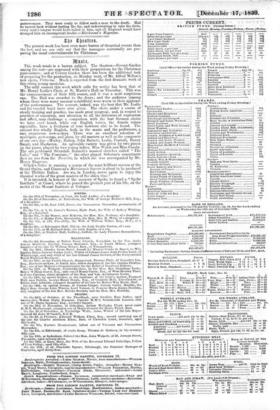3Ensir.
This week music is a barren subject. The theatres—Covent Garden among the rest—are engrossed with their preparations for the Christmas pantomimes; and at Covent Garden there has been the additional task of preparing for the production, on Monday next, of Mr. Alfred Mellon's new opera, Vielorine. Much is expected from the first dramatic work of this rising young musician.
The only concert this week which calls for notice has been that of Mr. Henry Leslie's Choir, at St. Martin's Hall on Thursday. This was the commencement of their fifth season, and it was a most auspicious one. The Hall was crowded to the doors ; and the audience (among whom there were many musical notabilites) were warm in their applause of the performances. The concert, indeed, was the best that Mr. Leslie and his tuneful band have ever given. The choir, under a course of steady training and practice, has made great progress; and, in respect to precision of execution, and attention to all the delicacies of expression and effect, may challenge a comparison with the best German choirs we have ever heard, while our English voices the female voices especially, have a freshness of tone nowhere else to be found. The concert was wholly English, both in the music and the performers, a rare occurrence now-a-days. There was an excellent selection of madrigals, part-songs, and glees, by old masters as well as the composers of our own day—Morley, Bishop, John Barnett, Leslie, Pearsall, Henry Smart, and Macfarren. An agreeable variety was given by two pieces on the piano, played by two young ladies, Miss Walsh and Miss Cazaly. The one performed Sterndale Bennett's musical sketches called "The Lake," and "The Fountain;" the other played Osborne's concertante duet on airs from the Favorite, in which she was accompanied by Mr. Henry Blagrove.
Gliick's Orfea is running a course of the most brilliant success at the Grand Opera and Cimarosa's Matrimonio Segreto is about to be produced at the Thefitie Italien. Are we in London, never again to enjoy the -classical works of the great masters of the olden time ?
It is intended, in honour of the memory of Spohr, to found a " Spohr Institute" at Cassel, where he passed the greatest part of his life, on the model of the Mozart Institute at Cologne.


























 Previous page
Previous page